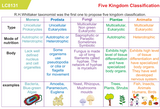
A brief lesson on Taxonomy using the 5 Kindom classification system, along with phylogenetic tree.
- Subject:
- Biology
- Material Type:
- Activity/Lab
- Assessment
- Homework/Assignment
- Author:
- Jeffery Smith
- Date Added:
- 03/05/2020

A brief lesson on Taxonomy using the 5 Kindom classification system, along with phylogenetic tree.
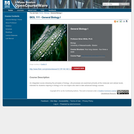
An integrated course stressing the principles of biology. Life processes are examined primarily at the molecular and cellular levels. Intended for students majoring in biology or for non-majors who wish to take advanced biology courses.

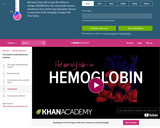
This 15-minute video lesson examines hemoglobin and its role in the circulatory system. [Biology playlist: Lesson 40 of 71].

Short Description:
Biology textbook based on the OpenStax biology book.
Word Count: 93199
ISBN: 978-1-63635-004-2
(Note: This resource's metadata has been created automatically by reformatting and/or combining the information that the author initially provided as part of a bulk import process.)
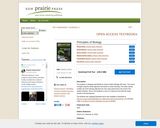
This textbook is designed specifically for Kansas State's Biology 198 Class. The course is taught using the studio approach and based on active learning. The studio manual contains all of the learning objectives for each class period and is the record of all student activities. Hence, this textbook is more of a reference tool while the studio manual is the learning tool.
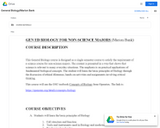
General Education Biology Course for non-science majors
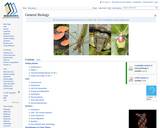
The word biology means, "the science of life", from the Greek bios, life, and logos, word or knowledge. Therefore, Biology is the science of Living Things. That is why Biology is sometimes known as Life Science.
Wikibooks is a collaborative book authoring website, where users from all over the world work together to write textbooks and other types of instructional books on many topics. It is a Wikimedia project, operated by the same group of people who run Wikipedia, the Wikimedia Foundation. You can edit this page, and almost all pages like it, at any time. That is the basic principle of Wikibooks: anyone can edit it.
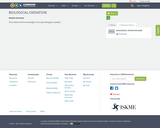
This module test the knowledge in the topic-Biological oxidation

This is a Community College course syllabus used for our BIO 103, Principles of Biology I course. The OpenStax Biology textbook was used with this course along with virtual labs through Merlot.

The MIT Biology Department core courses, 7.012, 7.013, and 7.014, all cover the same core material, which includes the fundamental principles of biochemistry, genetics, molecular biology, and cell biology. Biological function at the molecular level is particularly emphasized and covers the structure and regulation of genes, as well as, the structure and synthesis of proteins, how these molecules are integrated into cells, and how these cells are integrated into multicellular systems and organisms. In addition, each version of the subject has its own distinctive material.
7.014 focuses on the application of these fundamental principles, toward an understanding of microorganisms as geochemical agents responsible for the evolution and renewal of the biosphere and of their role in human health and disease.
Acknowledgements
The study materials, problem sets, and quiz materials used during Spring 2005 for 7.014 include contributions from past instructors, teaching assistants, and other members of the MIT Biology Department affiliated with course 7.014. Since the following works have evolved over a period of many years, no single source can be attributed.
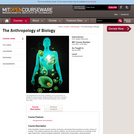
This course applies the tools of anthropology to examine biology in the age of genomics, biotechnological enterprise, biodiversity conservation, pharmaceutical bioprospecting, and synthetic biology. It examines such social concerns such as bioterrorism, genetic modification, and cloning. It offers an anthropological inquiry into how the substances and explanations of biology—ecological, organismic, cellular, molecular, genetic, informatic—are changing. It examines such artifacts as cell lines, biodiversity databases, and artificial life models, and using primary sources in biology, social studies of the life sciences, and literary and cinematic materials, and asks how we might answer Erwin Schrodinger’s 1944 question, “What Is Life?” today.

This course provides an introduction to cellular and population-level systems biology with an emphasis on synthetic biology, modeling of genetic networks, cell-cell interactions, and evolutionary dynamics. Cellular systems include genetic switches and oscillators, network motifs, genetic network evolution, and cellular decision-making. Population-level systems include models of pattern formation, cell-cell communication, and evolutionary systems biology.
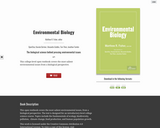
Short Description:
This college-level open textbook covers the most salient environmental issues from a biological perspective. Order a print copy: http://www.lulu.com/content/paperback-book/environmental-biology/23350620
Long Description:
This open textbook covers the most salient environmental issues, from a biological perspective. The text is designed for an introductory-level college science course. Topics include the fundamentals of ecology, biodiversity, pollution, climate change, food production, and human population growth.
Order a print copy: http://www.lulu.com/content/paperback-book/environmental-biology/23350620
Word Count: 95192
ISBN: 978-1-63635-036-3
(Note: This resource's metadata has been created automatically by reformatting and/or combining the information that the author initially provided as part of a bulk import process.)

An Introduction to Biological Concepts has been modified from several OpenStax textbooks including Concepts of Biology, Biology 2E, Microbiology and Anatomy and Physiology. Each textbook can be accessed for free in its original form by clicking on the link: https://openstax.org/subjects/science The OpenStax textbooks are licensed under Creative Commons Attribution License 4.0. The images, photos, graphs, etc. used in this textbook have each been individually attributed. Images, photos, graphs, etc. have different creative commons licenses and have been licensed according to their original authors. An attribution table can be located on the last pages of this textbook.
Any questions about an Open Education Resource textbook can be sent to biology faculty member Elizabeth (Liz) O'Grady via email: eogrady@clcillinois.edu
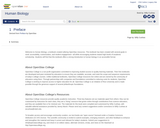
This textbook has been created with several goals in mind: accessibility, customization, and student engagement—all while encouraging students toward high levels of academic scholarship. Students will find that this textbook offers a strong introduction to human biology in an accessible format.
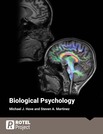
Biological psychology is the study of the biological bases of behavior and mental processes. It explores how biological factors like genes, hormones, neurotransmitters, and brain structures influence psychological components like thoughts, emotions, memories, and actions. This free and open textbook provides a wide ranging and up-to-date introduction to the main topics and methods of biological psychology.
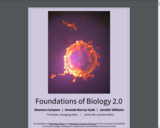
An adaptation of OpenStax Biology and OpenStax Concepts of Biology from Greenfield Community College. in this version, we've curated content from both open textbooks to create a version suitable for an intro biology class in a community college, which frequently includes both biology majors and students taking the course as part of a general education curriculum.

In this course, you will engage in the biology of cells of higher organisms. You will study the structure, function, and biosynthesis of cellular membranes and organelles; cell growth and oncogenic transformation; transport, receptors, and cell signaling; the cytoskeleton, the extracellular matrix, and cell movements; cell division and cell cycle; functions of specialized cell types. This course emphasizes the current molecular knowledge of cell biological processes as well as the genetic, biochemical, and other experimental approaches that resulted in these discoveries.
This course, based on the MIT course 7.06 Cell Biology taken by enrolled MIT students, was organized as a three-part series on edX by MIT’s Department of Biology. It is self-paced and free as long as you enroll in the Audit Track option, which you can select after creating a free account on edX.
![Fundamentals of Biology Research Project [Biology]](https://img.oercommons.org/160x134/oercommons/media/upload/materials/screenshots/materials-course-280638.png)
The goal of this initiative is to improve students' learning of the subject while developing their Inquiry and Problem-Solving competencies as well as their numeracy, written, digital and oral communication abilities. A flipped-class approach will be taken to present different topics ahead of the practical laboratory experiences. Topics will be presented with PowerPoints and/or videos posted on Blackboard. Students will be given a low stakes quiz at the beginning of each laboratory session to assess their knowledge and understanding of the posted material. A research project, introduced at the beginning of the semester, will be used as the backbone to integrate inquiry and problem-solving competencies to the laboratories. Each laboratory will explore a question/aspect outlined in the research project; students will be expected to work in pre-assigned groups and present individual written outputs, data, and analysis at the end of each laboratory session. Students will be expected to compile their results obtained during the semester, and make a digital/oral presentation at the end of the term. Students will collect background information and complete four written assignments; students will receive feedback on these assignments to allow for improvements and successful completion of the final presentations. Each individual student will also be required to write three laboratory reports. Collaborative work with group members will be essential for successful learning using an Inquiry and problem solving approach, although written reports will be marked individually, per the guidelines given in the assignments. The syllabus for the lecture component of these sections is identical to the syllabus of the standard versions of this course; the grading procedures for the laboratory component of the course are modified as described in the grading policy below.
LaGuardia's Core Competencies and Communication Abilities
Main Course Learning Objectives:
This course is an integrated two-semester laboratory-based sequence, stressing major concepts of biology designed to assist the student in relating these concepts to the environment. The scientific method of thinking and the experimental approach will be stressed. Among the topics studied are: SCB201 Cellular and molecular basis of life, heredity, and the evolution of life.